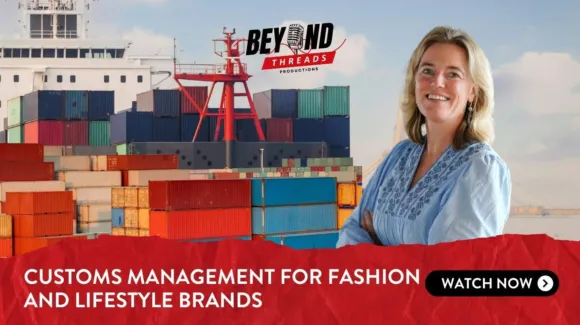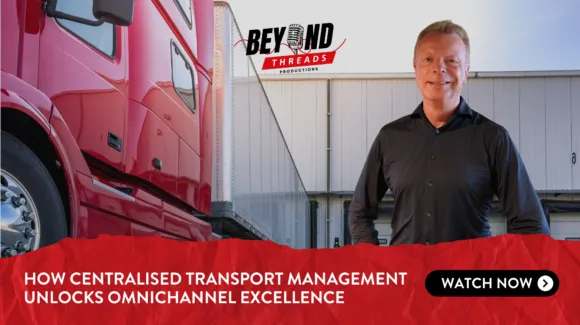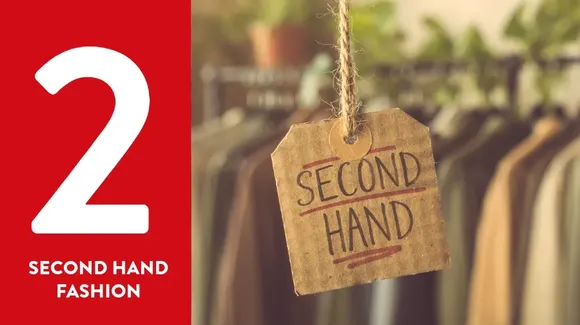Customs duties are an inevitable cost of doing international business. But while many still treat customs management as merely a cost centre, the most successful international brands view it as a chess game where the right moves can deliver substantial competitive advantages. The difference lies in understanding that customs is about strategic decision making that helps optimise your international operations.
Press play on this episode of Beyond Threads to hear from our Customs Director, Katja Idsinga-Schellaars, as she explains how customs management can be a strategic growth lever for your brand.
Calculating customs duties effectively
On the surface, customs duty calculations follow a deceptively simple formula: tariff rate multiplied by customs value. Yet within this basic equation lie multiple opportunities for strategic optimisation that are easy to overlook without specialist knowledge.
“The tariff component depends on accurate HS code classification and understanding how country of origin affects applicable rates,” explains Katja. But it’s the ‘customs value’ element where sophisticated brands often find the most significant opportunities for legitimate cost reduction.
“Free trade agreements between countries often provide preferential duty rates or complete duty elimination for qualifying products, but these benefits only apply when goods meet specific origin requirements and proper documentation is maintained,” continues Katja. “That’s why it’s so important to be proactive in your customs management approach.”
Listen To Audio Only
Making strategic warehousing decisions
When goods are stored in bonded warehouses, they remain under customs supervision, with duties only becoming due upon actual importation. Therefore, the choice between immediate importation and bonded warehousing is a strategic decision that affects cash flow, operational flexibility and duty exposure. Sometimes, making use of such facilities can save brands from hefty customs duty bills.
“This arrangement provides significant cash flow advantages, particularly for fashion brands with seasonal inventory patterns or uncertain demand forecasting,” says Katja. “For brands whose products face zero duty rates, bonded warehousing provides no financial advantage. However, when your goods do attract duty and are destined for other countries, bonded storage can prevent double duty payments.”
Getting specialist support for customs management
With so many factors to consider, optimising your customs management approach can seem like a monumental task. But fashion brands don’t need to face it alone. Working with a specialist logistics partner can transform complex regulatory requirements from operational burden into strategic advantage.
Effective customs management requires sophisticated data systems and global infrastructure that most fashion brands don’t have in-house. Specialist logistics partners already have the capabilities and expertise in place, delivering streamlined processes that can accelerate international expansion.
Ready to turn customs into your competitive advantage?
The brands that win consistently in international markets don’t just manage customs – they leverage it. Strategic customs management delivers more competitive pricing, accelerated market entry and operational flexibility that creates lasting advantages over competitors who view compliance as an operational burden. When margins are thin and speed determines success, customs expertise is essential for international growth.
Press play on this episode of Beyond Threads to get the full story from Katja and learn how transforming your approach to customs management can turn streamlined compliance into a key strategic asset. Get in contact for a free consultation with a Bleckmann expert.
__________________________________________________________________________________________________________________
Transcript
Katja Idsinga-Schellaars (Bleckmann):
Hello and welcome to the Beyond Threats webinar, where we explore fashion, logistics, and customs in a rapidly changing regulatory landscape. I’m Katja Idsinga-Schellaars, Customs Director at Bleckmann, and I’ll guide you through today’s session on custom strategies.
Overview:
We’ll cover main customs rules, stakeholders, procedures, and declarations.
I’ll also share strategies for turning customs compliance into a growth opportunity.
Customs basics:
The European Union is treated as a single customs territory.
Customs rules are enforced by national administrations, but other parties like importers/exporters and customs brokers are involved.
Common procedures include imports, exports, bonded warehousing, and transit.
Customs declarations require data elements identifying parties, products, and details to calculate duties.
Customs data elements & strategies:
Duties are calculated by multiplying the tariff (from the HS code) by the customs value.
Origin of the product matters:
Preferential origin can lower duties via free trade agreements.
Non-preferential origin may impose restrictions or anti-dumping duties.
Free trade agreements can reduce or abolish standard tariffs between countries.
If preferential origin isn’t available, consider optimizing customs value, e.g., via the “first sale for export” rule in the US (not applicable in the EU).
Supply chain strategies:
Import declaration & VAT: Duties and VAT are due upon filing, but storing goods in a customs bonded warehouse delays duty payment until goods are imported—improving cash flow, but adding administrative work.
If goods are zero-rated, bonded warehousing may not be needed.
If goods are shipped to multiple countries, bonded storage can prevent double duty payments. Example: Import into the Netherlands, store, then ship to the UK.
Return Goods Regime (RGR): Can be applied under strict conditions for returned fashion items. Requires a one-to-one match of exported and returned goods.
Low-value imports: Many countries allow low-value shipments without duties and simplified declarations, useful for B2C shipments.
Conclusion:
Custom strategies—like using bonded warehouses, leveraging free trade agreements, applying RGR, and low-value import facilitation—can turn customs from a cost center into a supply chain advantage. Careful planning of these elements can improve cash flow, reduce duties, and streamline operations.
Thank you for joining this webinar. I hope it provides insights for optimizing your supply chain strategy. I’m Katja, and I’ll see you at the next Beyond Threats webinar.
















